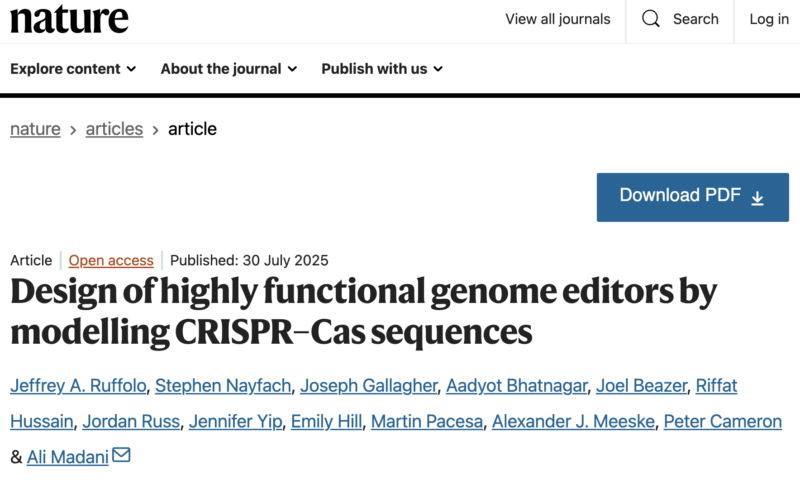
Olivier Elemento: AI-Designed Genome Editors Are Here
Olivier Elemento, Director of the Englander Institute for Precision Medicine at Weill Cornell Medicine, shared a post on LinkedIn about a paper by Jeffrey Ruffolo et al. published in Nature:
“AI-Designed Genome Editors Are Here
For all its power, the widely used CRISPR-SpCas9 (the most common version of Cas9, from Streptococcus pyogenes) system has limitations for therapeutic use, including off-target cuts and immune responses.
A stunning new paper in Nature from Jeffrey Ruffolo, Ali Madani, and colleagues presents a groundbreaking solution: a completely synthetic, AI-generated CRISPR system that successfully edits the human genome with high precision.
The team used a generative AI approach to design a novel protein from the ground up, moving beyond the constraints of systems found in nature.
A New Foundation of Data
The project began by building the CRISPR-Cas Atlas, a new database of over 1.2 million CRISPR systems found by mining 26.2 trillion bases of microbial genomes and metagenomes. This provided the rich dataset essential for training the AI.
Learning the Language of Proteins
Their strategy relied on a protein language model, which functions like a GPT for proteins. By analyzing millions of protein sequences, the model learns the ‘grammar’ of protein evolution. They used a hierarchical training process, fine-tuning a general model on their CRISPR atlas and then specializing it on just Cas9 sequences to master the editor’s design.
After this training, the AI generated 350,000 novel Cas9-like proteins, which were put through a rigorous computational and experimental filtering funnel, leading to the identification of one top performer.
Introducing OpenCRISPR-1
This AI-designed editor represents a significant leap forward:
- Superior Specificity: It matches the on-target editing efficiency of the gold-standard SpCas9 but with a remarkable 95% reduction in off-target edits.
- Novel Structure: It is substantially different from any known natural variant, with 403 mutations separating it from SpCas9.
- Reduced Immunogenicity: The protein sequence lacks certain sites recognized by the immune system, indicating it may be less likely to trigger an unwanted immune response.
- Proven Functionality: It is not only effective for standard gene editing but is also compatible with other advanced tools like base editors.
I believe this work, particularly the ‘pretrain, fine-tune, generate, filter’ framework, offers a powerful template for optimizing existing proteins and creating desired features. We are likely just beginning to see the transformative potential of this approach.”
Title: Design of highly functional genome editors by modelling CRISPR–Cas sequences
Authors: Jeffrey Ruffolo, Stephen Nayfach, Joseph Gallagher, Aadyot Bhatnagar, Joel Beazer, Riffat Hussain, Jordan Russ, Jennifer Yip, Emily Hill, Martin Pacesa, Alexander Meeske, Peter Cameron, Ali Madani
You can read the Full Paper on Nature.

More posts featuring Olivier Elemento on OncoDaily.
-
Challenging the Status Quo in Colorectal Cancer 2024
December 6-8, 2024
-
ESMO 2024 Congress
September 13-17, 2024
-
ASCO Annual Meeting
May 30 - June 4, 2024
-
Yvonne Award 2024
May 31, 2024
-
OncoThon 2024, Online
Feb. 15, 2024
-
Global Summit on War & Cancer 2023, Online
Dec. 14-16, 2023
